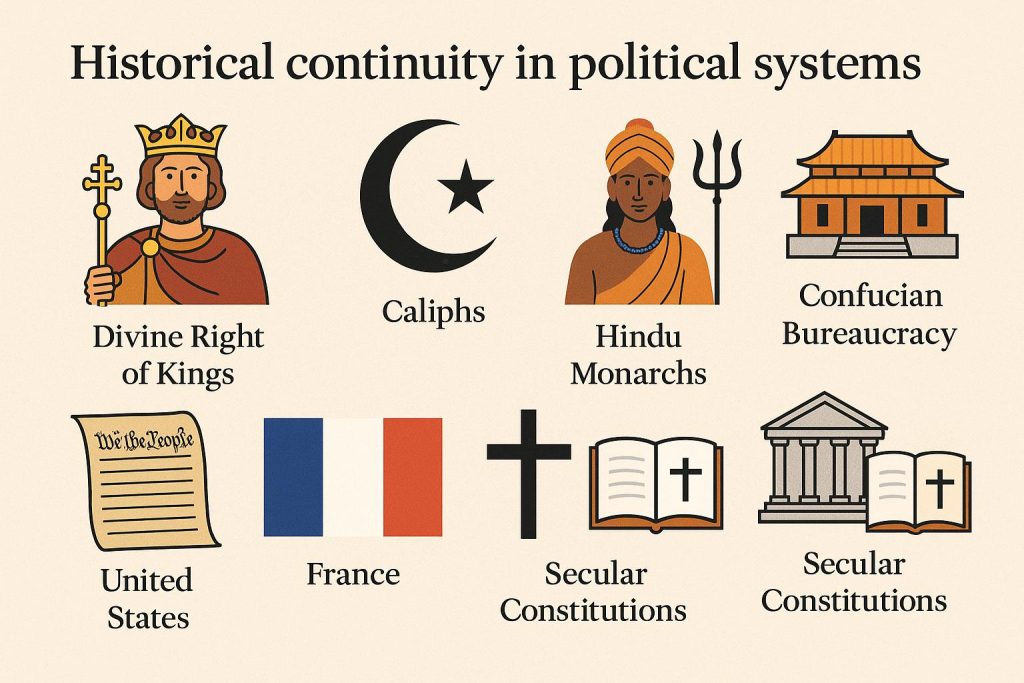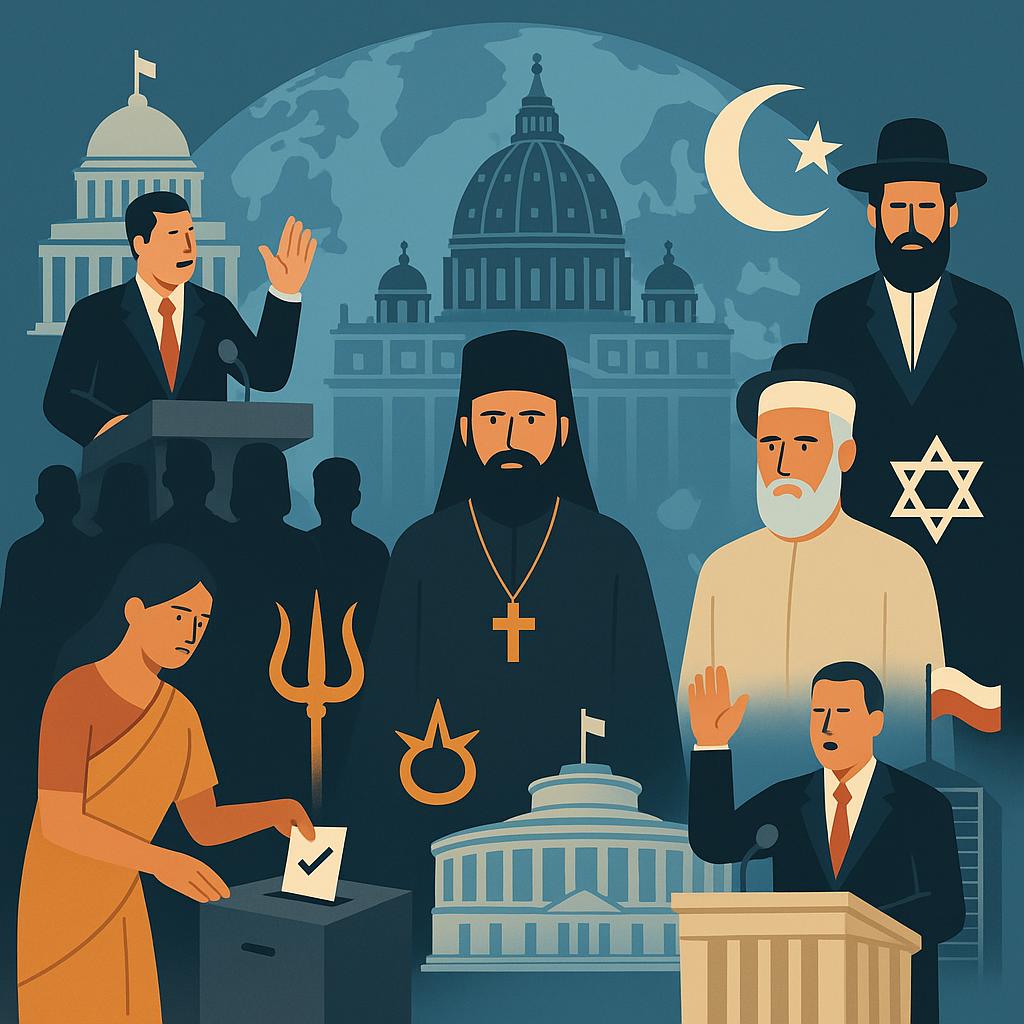Modern societies like to believe they have left religion behind. They speak of secular states, rational laws, and scientific progress. Yet when we look closer, politics still bends under the weight of religious traditions. Religion continues to shape institutions, voter behavior, and geopolitical choices. Its influence is not only spiritual. It is political, financial, and deeply strategic. To understand today’s politics, we must recognize religion as a silent but powerful actor.
Historical continuity in political systems
Politics and religion have always been intertwined. Kings once ruled by divine right. Caliphs joined faith and government in one body. Hindu monarchs tied ritual to rule. Confucian bureaucracy sanctified political obedience. Even after revolutions introduced secular constitutions, the moral codes remained religious.

The United States declared separation of church and state. Yet its Constitution reflects Protestant values of individual conscience and civic duty. France built republicanism in struggle with Catholic power. Even then, Catholic heritage shaped its politics. Secularism never erased religion. It only repackaged its legacy into new forms.
Religion as political identity
Religion also works as identity. Politicians invoke it to mark belonging and exclusion. The “Christian West” narrative became central to European debates about migration. Turkey’s Erdoğan paints critics as enemies of Islam. Modi fuses Hindu myth with nationalism to rally support. Religion remains the quickest way to prove loyalty and mobilize masses.
The Vatican as a global political player
The Vatican demonstrates religion’s political endurance more than any other institution. It is not just the center of Catholic faith. It is a sovereign state with diplomats, embassies, and enormous wealth. Its network reaches into every continent. The Vatican Bank, its global real estate empire, and its tax-free holdings make it a financial actor as much as a spiritual one.
It holds observer status at the United Nations, it influences legislation on education, bioethics, and family law far outside Italy. It survived fascism, communism, and liberal revolutions. While empires collapsed, the Vatican never disappeared. It is the most enduring political institution in the West, and it speaks with governments as their equal.
Vatican power in Poland
Poland shows the Vatican’s direct political power. The Church stood at the center of anti-communist resistance. Pope John Paul II became a national symbol, tying patriotism to Catholicism. After 1989, the Vatican translated moral authority into political control.
Today bishops openly pressure governments. They dictate abortion laws, restrict sexual education, and dominate public schools. When Poland’s Constitutional Court banned almost all abortions in 2020, it reflected Vatican teaching more than democratic consensus. Politicians seeking office kneel before bishops for legitimacy. Parties that oppose the Church lose relevance. The Vatican rules Poland without winning elections.
Moral frameworks in legislation
Religious morality still drives political battles. Abortion, euthanasia, and same-sex marriage debates across the world echo centuries-old religious categories. Secular politicians repeat them almost word for word. In Poland, bishops dominate. Catholic doctrine still blocks progressive laws in Latin America. In the U.S., Evangelicals have successfully reshaped the Supreme Court to overturn Roe v. Wade. Politics constantly mirrors theology.
Religion as organized political power
Religious institutions operate like disciplined political parties. They control universities, charities, and media outlets. They have loyal networks of activists. In the U.S., Evangelical churches mobilize millions of voters, raise campaign funds, and directly influence legislation. Clerics dominate parliaments and courts in Iran and Pakistan. In Myanmar, Buddhist monks organize nationalist movements. The Vatican commands schools, seminaries, and global charities that funnel influence into politics on every continent.
Religion and populist politics
Populist leaders embrace religion because it divides society with clarity. It defines a blessed “us” against a cursed “them.” Putin presents himself as defender of Orthodox Christianity against the West. Trump portrayed himself as chosen by Evangelicals to save America. Modi uses Hinduism to cast Muslims as outsiders. Religion becomes the stage for populist theater.
Religion embedded in secular ideologies
Even secular movements mirror religious forms. Marxism promised paradise after sacrifice, echoing messianic prophecy. Nationalism turned flags, anthems, and holidays into rituals. Human rights discourse—celebrated as universal—arose from Christian morality. Atheism defines itself against religious categories, showing religion still frames the debate. The secular world cannot fully escape religious templates.
The American paradox: Religion in a secular republic
The U.S. illustrates the paradox of religion in a secular state. The Constitution proclaims separation of church and state. Yet religion dominates its politics more than in many openly religious nations. Evangelicals form one of the most powerful political blocs. They determine election outcomes, especially in swing states.
They lobby against abortion, same-sex marriage, and secular education; they shape foreign policy by demanding unconditional support for Israel, often rooted in apocalyptic visions. Presidents and Congress members regularly reference God in speeches to secure trust. Supreme Court nominations are fought like holy wars, with judges chosen for their religious leanings.
American politics cannot escape religion because voters demand faith as proof of morality. Secular candidates rarely succeed nationally. Every president swears the oath on the Bible. In practice, religion is not separate from the state—it is the beating heart of its politics.
Religion in global geopolitics
Religion does not only operate inside nations. It defines entire international strategies. U.S. foreign policy in the Middle East is not just about oil pipelines or military bases. Evangelical movements frame Israel as a fulfillment of biblical prophecy, pushing Washington to defend it unconditionally. That vision shapes military aid, vetoes at the UN, and the structure of alliances.
At the same time, religious divisions drive the region’s own wars. The rivalry between Sunni Saudi Arabia and Shia Iran is not simply a struggle for power. It is rooted in centuries of theological conflict, which fuels proxy wars in Yemen, Iraq, Lebanon, and Syria. These conflicts last because religion gives them depth and legitimacy. Leaders cannot compromise without betraying faith.
The Vatican also acts globally. It sends diplomats into transitions of power in Latin America, Africa, and Eastern Europe. During the Cold War, it played a crucial role in weakening communism. Today it still mediates conflicts, pushes for recognition of its doctrine in peace agreements, and shapes political elites through Catholic universities. The Vatican does not need armies—it wields history, networks, and moral authority.
In Africa, religious movements often decide whether governments stand or fall. Pentecostal churches grow faster than state institutions. Islamic charities provide services where governments fail, turning faith into political loyalty. In Asia, Buddhist nationalism fuels violence in Myanmar and Sri Lanka, while Hindu nationalism in India pushes foreign policy toward confrontation with Muslim neighbors.
Ultimately, religion grants legitimacy where secular power appears fragile. Leaders often turn to faith when their rule loses credibility. Foreign alliances are justified by religious bonds. Wars are sanctified with divine language. Even in an age of satellites and nuclear weapons, religion still writes the script of geopolitics.
Why elites underestimate religion’s role
Elites in secular societies believe rationalism has replaced faith. They think economic interests or nationalism explain everything. Media outlets frame conflicts as material struggles. Yet this blindness is cultural. Secular elites underestimate religion because they no longer practice it. They forget that billions of people still vote, fight, and sacrifice under religious banners.
Conclusion
Religion never left politics. It only adapted. The Vatican shows its power in Poland, where bishops rule law and education without running for office. Evangelicals show it in the United States, where they control Supreme Court outcomes and foreign policy. Around the world, religion still defines identities, directs morality, and grants legitimacy. Ignoring it means misunderstanding politics itself.
If humanity wants to move beyond religious domination, one single global agency would need to be strong enough to break that hold. Only an institution more powerful than the Vatican, more organized than Evangelicals, and more persuasive than populists could finally take the world out from under religion’s shadow.

Leave a Reply